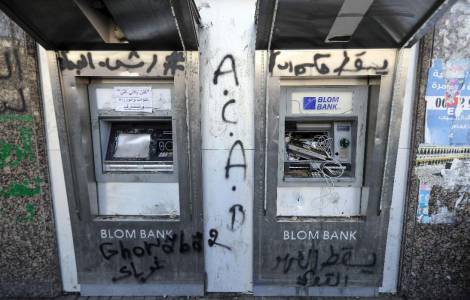
MiddleEast Online
Damascus (Agenzia Fides) - The crisis in the economy and the Lebanese banking system spreads its devastating effects even among the already tormented Syrian population, particularly affecting the many families of Syria that during the war had tried to save their money depositing them in the banks of Lebanon. This was reported by Samir Nassar, Maronite Archbishop of Damascus, who describes to Agenzia Fides the reasons for the umpteenth crisis factor that has come to penalize the ordinary condition of so many Syrians. "Lebanese banks" the Archbishop states "have been lending money for 29 years to the State…. Now the State is bankrupt and unable to pay back". In recent days, Lebanese banking institutions have begun to apply "extraordinary measures" to contain capital flight, after their customers, before the explosion of the crisis, had begun to take out more from their personal accounts, withdrawing cash in dollars, to deposit them in foreign banks. The restrictive measures also provoked clashes, with episodes of vandalization of ATMs (see photo) and customers who threatened with arms the employees at the counters.
Now individuals no longer have the possibility to take out more than 600$ a week from their personal accounts. And the measure also affects the many Syrians who had transferred their personal property to Lebanese banking institutions. The restrictive measures - reports Archbishop Nassar - also affect many of the 13 employees and 600 families assisted by the Maronite Archdiocese of Damascus.
The new economic-financial emergency - adds the Archbishop - is the umpteenth "strict" effect imposed by the Iranian-American stronghold on the whole of the Middle East. "The local currency" adds the Archbishop "is falling rapidly in value against the dollar which is now becoming a rarity in circulation. We must remember that all imports of essential goods must be paid for in foreign currency". This new situation means that the people must once again get used to a life of austerity and a greater solidarity: Going to work sharing places in a car, or relying on public transport. Life is becoming bitter to bear. The larger shopping places are almost empty, and "family life has once more become a treasured gift". "Whatever is really happening", concludes the Maronite Archbishop of Damascus, "is surely a new society which is growing around us on the eve of Christmas". (GV) (Agenzia Fides, 28/11/2019)